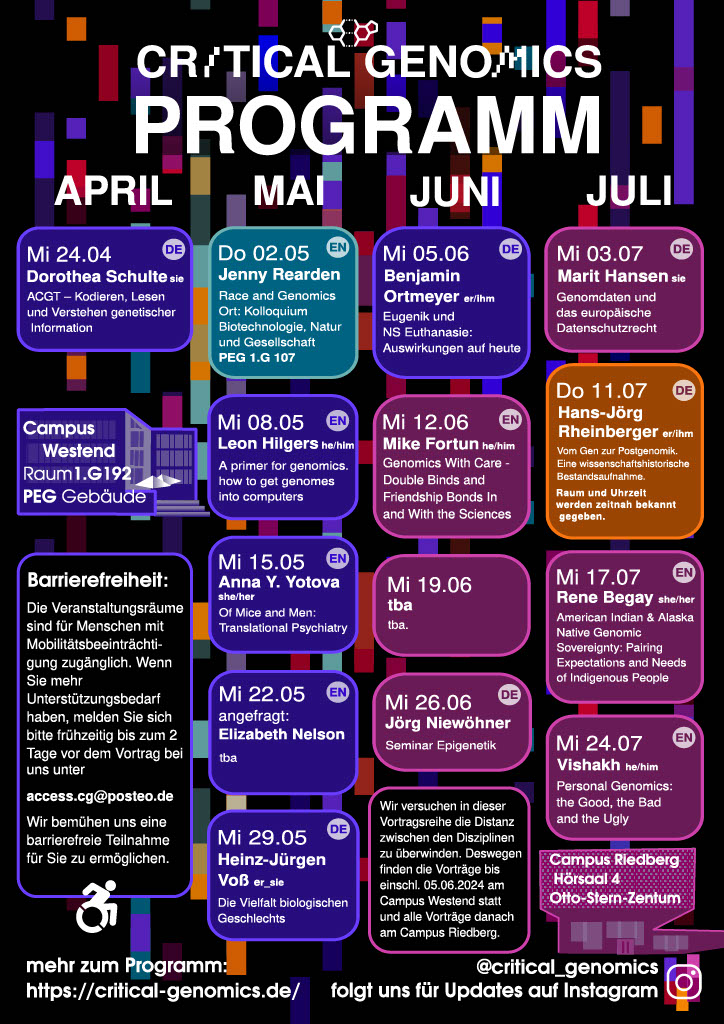Institute News
Here you will find current news from the institute. Also have a look at our Events page. STS student scan find all information about the implementation of their studies including deadlines and dates under For MA Students.
Summer Term 2024
For more Information click here.

Summer Term 2024
19.04.2024, 10:00 – 12:00 Uhr c.t. - Campus Westend, IG 1.414
Between the 1960s and 1990s, various forms of “alternative" knowledge entered the political sphere, challenging established relationships between science, expertise and politics. Social movements – most prominently the environmental, feminist, queer, peace and “Third World" movements – called for new forms of knowledge production and circulation that were closer to “the people". The term widely used was “Gegenwissen": “counter-knowledge" or “radical science" produced in opposition to the perceived hegemony of the military-industrial complex. By enhancing the authority of lay expertise and advocating for a democratization of knowledge production, social movements reinterpreted one of the fundamental principles of democracy – participation – as an “epistemic virtue".
However, in the face of conspiracy theories and science denialism, counter knowledge has lost much of its original glamor. What is the state of "alternative knowledge" today and how can a historical perspective help us to change the view on the ruptures within our current knowledge culture – both, in academia and beyond?
The workshop is a cooperation of the Institute for Cultural Anthropology and the History of Science work group at Goethe University Frankfurt in collaboration with the Institute for Historical Sciences at the University of Bremen. It is organised by Martin Herrnstadt, Timotheus Kartmann, Janine Hagemeister and Catharina Dietrich.
A text to prepare the discussion will be provided after registration for the event at datenpolitiken@uni-frankfurt.de

Summer Term 2024
You can download the current teaching program here.
Winter Term 2023/24
We live in times of global environmental crises, which are publicly negotiated as not only causing a range of immediate health effects on humans but also threaten the ecosystems that our political economy has been hitherto relying upon. These effects generate further consequences, in agriculture, industry, in human and non-human migration and so many more areas – across culture and society.
To find orientation in these times, private and public actors draw on various forms of knowing environments, often digitally infrastructured. Actors include individual members of publics, corporate as well as public agency staff in environmental management and environmental governance. In the winter semester 2023-24, across four courses taught at the Institute of Cultural Anthropology and European Ethnology at Goethe University Frankfurt, we researched such forms of knowing environments, learning about social science research methods in practice (especially ethnography), applying STS and anthropological analytics of data infrastructures, human-nature relations, modern organisational forms, politics, troubles; and we engaged in collaboratively learning, exercising constructive critique, inhabiting positions of researchers.
The four courses have been the KaEE Ba course WPM 2 "Forschungsseminar Digitalisierung" (Naturen digitalisieren – Digitalisierung naturalisieren), the Science and Technology Studies MA courses MA 2.1 "Technologies of Governance" (Infrastructuring ecosystem services), MA 3.1 Markets and Cultures (Climate and other environmental markets) and the MA 5.2 Method Toolbox.
Join us for our end of semester poster conference on Friday, 2nd February 2024 14:00 to 15:30 at Casino – room CAS 1.811. Discuss with student groups about their research, learn about the research site and the various forms of knowing it and finding orientation in it. Most student groups do include German speakers, so conversation should well be possible across the multilingual setting.
For questions, contact: Dr. Ingmar Lippert
Winter Term 2023/24
- Studying at Goethe University
- International applicants
- Faculties
- Overview of study programmes
- Programme for refugees
- GRADE
- Goethe Business School (continuing education)
- Research at Goethe University
- Scientific news
- Goethe Welcome Center (for international researchers)
- Collaborative research projects
- Individual research
- Visiting fellowships
- Endowed chairs
- About the University
- News-in-brief
- University administration
- Campus locations
- Campus life
- University archives (German)
- Rhine-Main-Universities





